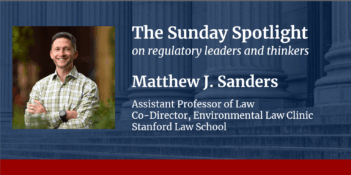
Wilson’s Bureaucracy course at Harvard was the beginning of a lifelong professional relationship.
I began as a political science graduate student at Harvard in 1980. James Q. Wilson had just finished editing The Politics of Regulation. With characteristic humility and humor, he said the volume was by his “wonderful former graduate students,” adding that I should read it “if only to learn about the kind of work done by people unlucky enough to be advised by me.”
I was blessed to join that “unlucky” number. He supervised my dissertation (a multi-state study of prison management) and wrote about the book version of it in his masterful 1989 treatise, Bureaucracy: What Government Agencies Do and Why They Do It. I served as his teaching assistant and course administrator for both his introduction to American government course and his famous “Bureaucracy” course at Harvard (Government or “Gov” 150). From 1992 to 2012, I co-authored his best-selling textbook, American Government: Institutions and Policies, including the chapter on bureaucracy and the passages in various chapters on regulatory politics.
The Politics of Regulation contains superb case studies of the Antitrust Division of the U.S. Department of Justice, the Federal Maritime Commission, the Environmental Protection Agency, state public utility commissions, and others. Wilson thought about The Politics of Regulation as akin to his 1968 work
Varieties of Police Behavior: The Management of Law and Order in Eight Communities. The latter book had illustrated and attempted to explain varieties of police behavior across different local police departments. The former volume illustrated and attempted to explain varieties of regulatory behavior within and across different federal and state regulatory agencies.
But The Politics of Regulation went farther. Wilson interpreted the case studies as evidence against the notion that regulatory agencies were bound to be “captured” by special interests. As he wrote in the most recent edition of his textbook, “iron triangles are much less common today than once was the case,” in part because “the courts have made it much easier for all kinds of individuals and interests to intervene in agency affairs.” Nowadays, he added, “government agencies face a bewildering variety of competing groups and legislative subcommittees that constitute not a loyal collection of allies, but a fiercely competitive collection of critics.”
In the volume’s concluding chapter, Wilson took direct aim at theorists who attempted to explain bureaucratic behavior in regulatory agencies as rational, self-interested, budget-maximizing behavior or the like. In Bureaucracy, he generalized the point as follows: “Government agencies are not billiard balls driven hither and yon by the impact of forces and interests. When bureaucrats are free to choose a course of action their choices will reflect the full array of incentives operating on them: some will reflect the need to manage workload; others will reflect the expectations of workplace peers and professional colleagues elsewhere; still others may reflect their own convictions.”
This raised an apparent self-contradiction in Wilson’s wider academic corpus. In the Politics of Regulation, he rejected rational choice theory in relation to bureaucratic behavior. But, a half-decade earlier, in Thinking About Crime (1975), he embraced it in relation to criminal behavior. In 1991, on the occasion of his election as president of the American Political Science Association (APSA), I was invited to write an essay on him for an APSA journal. I entitled it “James Q. Wilson and Civic Virtue,” and it was a valentine to my teacher, friend, and mentor. But before writing it, I asked him about the apparent self-contradiction. The test of a good theory, he cheerfully replied, is not only its explanatory power, parsimony, and predictive value, but also whether it yields an understanding that is “general, meaningful, and true” while illuminating what is “most important” or “most essential” about the behavior or phenomena under study. In his view, rational choice theory explained why most career criminals routinely break laws, but not why most career public servants routinely strive to faithfully execute laws.
For a scholar with big-time bona fides as a right-wing public intellectual, Wilson loved stories about great government leaders and public bureaucracies that worked. He was ever more temperamentally than ideologically conservative. His conservative temperament had him greet great government leaders and good public bureaucracies as lucky accidents, and to doubt that either regulatory agencies or other government agencies could be improved by plan or design.
Thus, in The Investigators, Wilson’s brilliant 1978 study comparing the Federal Bureau of Investigation to the Drug Enforcement Agency, he lambasts the “top-down” view of bureaucracy and insists that what agencies do, and how (and how well) they do it, cannot be “chosen, defined, revised, or discarded as a result of efforts” by leaders or reformers out “to achieve organizational goals or respond to public demands.”
By the same token, he opens Bureaucracy by warning that the book “is not very theoretical, neither is it very practical,” adding that readers “will not learn very much—if anything—about how to run a government agency.” He closes the book by offering a few “modest proposals for reform” (quite modest).
Wilson also carved into the preface of Bureaucracy his belief that the scholarship on bureaucracy that is “most helpful to public discourse and to college students” is that which sticks “as close as possible to what actually happens in real bureaucracies.”
But Wilson was never enamored with how traditional public administration scholars had stuck to the subject. In his 1994 acceptance speech for the John Gaus Award in Public Administration, he revealed publicly that he found public administration studies deadly boring. He also recounted that he had started teaching Gaus’s old Harvard public administration course only because teaching the course was a contractual condition of his Harvard appointment. To “console” himself and “irritate the faculty,” he renamed the course “Bureaucracy.”
Thank goodness for that contractual condition.
This essay is part of the Penn Program on Regulation’s online symposium, Remembering James Q. Wilson.




